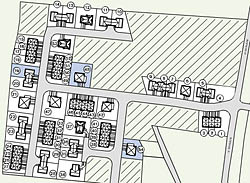
The emergence of satellites can be regulated by municipalities through zoning plans
 |
According to him, consideration should also be given to whether the planned residential complex will significantly alter the landscape character or what transport service options are available in the region. Another important condition is whether the municipality is prepared for the expected increase in the number of residents in terms of facilities, such as schools or leisure spaces.
"Newly established low-rise residential complexes in the suburban area of cities are often the result of uncontrolled suburbanization," Vorel said. According to him, an investor secures cheap land, requests a change in the urban plan, and where it was not originally planned, calmly builds 250 family houses.
A similar situation has occurred, for example, in Klínec near Prague, local councilor, actor, and presenter Vladimír Čech told ČTK. According to him, the previous municipal council approved a massive expansion of the municipality. The number of its residents is expected to increase from the current approximately 450 to 750 to 800 people. "This means a significant intervention in the life of the municipality. However, there is nothing that can be done about it now, the expansion of the urban plan and the urban decision are approved," Čech noted. According to him, the only option is to try to minimize the damage it will cause.
In Klínec, according to Čech, the lack of water has already manifested itself, and the new development lacks civic amenities. The previous council abolished the school, and the current municipal leadership wants to at least open a kindergarten in its building.
Dita Hánová lives in a satellite town in Vrané nad Vltavou. According to her, the advantages of this type of living outweigh the disadvantages. She is only bothered by poor transport accessibility or insufficient shops. On the other hand, it is balanced by a pleasant living environment, a friendly municipal leadership, and a well-functioning school.
Jaroslav Obermajer, head of the Environment Department of the Central Bohemian Regional Office, said that changes to urban plans resulting from the new building law are an opportunity for discussion about land use in the region. Experiences from the 1990s show that the local governments at that time underestimated urban planning. In particular, in the vicinity of Prague, satellite communities began to emerge massively, and the local municipalities are already feeling a shortage of school places, inadequate infrastructure, and lack of money for new roads.
The seminar on the issue of satellite towns and neighborhoods was organized by the Zvoneček Center for Environmental Education at the Czech Union for Nature Conservation in Vrané nad Vltavou. More than 50 mayors, municipal councilors, members of construction commissions, and environmental committees from the Central Bohemian Region, as well as several experts from the public, attended the event.
The English translation is powered by AI tool. Switch to Czech to view the original text source.
5 comments
add comment
Subject
Author
Date
Zahrady bez stromů, jen samé chvojky...
Bubák
17.05.07 06:57
Územní plán
palmexman
17.05.07 08:19
Kvalitní developer
Ondra
18.05.07 11:27
Osvěta
Pavel
30.05.07 07:31
Zatím je to spíše naopak
Bubák
31.05.07 06:15
show all comments












